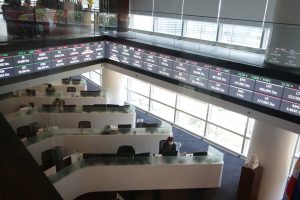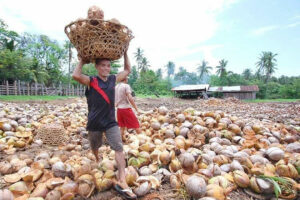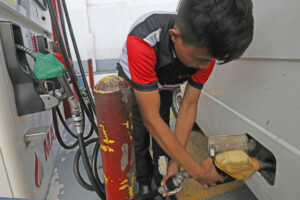By Vonn Andrei E. Villamiel
THE coconut industry stands to gain the most from the recent US tariff concessions, though analysts said the extent of these gains will depend on industry capacity and regional competition.
In an executive order, the US exempted from tariffs more than 200 agricultural commodities that it does not produce in large quantities. As such, some Philippine agricultural goods will no longer be subjected to the 19% reciprocal tariff.
Coconut and its derivatives are the Philippines’ top agricultural export to the US. In 2024, the Philippines exported P558 million worth of coconut oil to the US, accounting for 4.6% of the total, according to the Philippine Statistics Authority.
Charles R. Avila, president of the Confederation of Coconut Farmers’ Organizations of the Philippines, said the tariff exemptions are a “crucial relief to farmers and exporters.”
Mr. Avila told BusinessWorld via Viber that when Philippine exports, including coconut products, were charged higher tariffs, the initial response was to find alternative markets.
“Our immediate reaction, then, was that the US is not the only market there is for coconut. Europe has been big for the longest time and will be shifting now from oil palm to coconut products … there’s also Asia ready to gobble up anything coconut,” he said.
Agriculture Secretary Francisco P. Tiu Laurel, Jr. has said the tariff exemptions remove the doubts that had held back producers and exporters.
“Now people can plan, invest, and expand… As far as the DA is concerned, we have to start planting more … so that we can export more to the US,” Mr. Laurel told reporters on the sidelines of the 3rd Philippine Hydro Summit last week.
However, analysts also pointed out that the tariff exemptions are not specific to the Philippines. The US decision applies to all supplying countries, as part of its efforts to tame rising domestic food prices.
“The Philippines doesn’t suddenly have a monopoly on the opportunity to export duty-free to the US. Every other country exporting the same agri products to the US basically gets the same chance so the Philippines is not suddenly better off than its competitors and is really just in the same situation it was before Trump’s bullying tariffs since early this year,” IBON Foundation Executive Director Jose Enrique A. Africa told BusinessWorld via Viber.
Because of this, gains will ultimately boil down to production-side factors and regional competition, analysts said.
Samahang Industriya ng Agrikultura Executive Director Jayson H. Cainglet told BusinessWorld via Viber that the Philippines faces stiff competition within Southeast Asia. “For coconut oil and coconut water, Indonesia is now producing them at scale. For bananas, Indonesia, India, Vietnam, and China are our competitors,” he said.
Mr. Cainglet also said these countries enjoy government support and subsidies, giving them an advantage in scaling production and maintaining competitiveness.
“The pressure and responsibility are actually on the government to undertake strategic interventions to boost domestic value-added to gain a market edge. More high value-added processing and refining by Filipino firms will create and capture more value domestically,” Mr. Africa said.
He said the government should also take steps to allow small farmers and domestic producers to benefit from exporting agricultural products, such as by ensuring higher farmgate prices.
Eduardo Mora, a coconut farmer and former sectoral representative to the National Anti-Poverty Commission, told BusinessWorld via Facebook Messenger that much needs to be done to translate trade gains to farmer welfare.
“Sa bahagi ng magsasaka ng niyog, ang nagtatakda ng presyo ng raw material ay ang bumibili ng aming copra mula sa Pilipinas papuntang ibang bansa. Ang makikinabang dito ’yung negosyante at ’yung bibili, hindi naman mga magsasaka. (For coconut farmers, the price of raw materials is dictated by traders who export them to other countries. It is the businesses, not the farmers who will benefit,)” he said.
Mr. Mora said the government should also invest in building production capacity and developing local industries.
“Kaya naman ng Filipino na paunlarin ang industriya. Kailangan ng value-added processing para dito na sa Pilipinas gawin at mga Filipino, mga magsasaka ang makinabang. (Filipinos can develop their industries. We need value-added processing, so it can be produced here in the Philippines, and Filipino farmers will benefit),” he said.

















